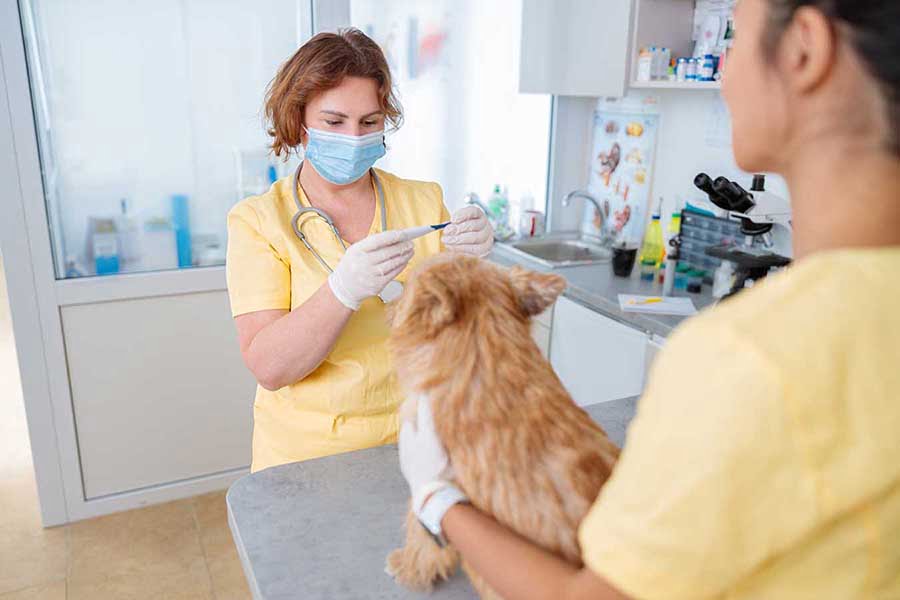Wondering how to choose the best dog vet near you? We’re here to help. When picking a veterinarian for your canine friend, you should ensure they can meet your dog’s medical needs. You should also pick one that you and your dog feel comfortable dealing with. This in-depth guide highlights eight key factors to consider when choosing a dog vet, along with questions you need to ask to ensure that your dog will be well taken care of.
Article contents
1. Provided services
Review the vet’s list of services to determine whether they fit your dog’s medical needs. Does the veterinarian offer in-house x-rays, radiology, ultrasounds, surgeries, neutering, or just general care? You can quickly access this information online, yet you may need to make a short call or visit the clinic to ask for more details.
Here are a couple of questions to help you assess the services provided by a vet practice:
- Do the services provided fit my dog’s health condition?
- Are there additional non-medical services like grooming, boarding, and training?
2. Emergency care
Many vets can provide emergency pet care. Some, however, can’t handle emergencies as their clinics lack the necessary equipment and staff to do so. In this situation, the vet will refer you to another practice that can provide the required treatment for your dog.
The answers to the following questions will help you assess the emergency care of the clinic:
- How does the practice handle emergency calls?
- If the practice doesn’t provide in-house emergency care, which facility does it refer to in this case?
3. Practice size
Veterinary practices vary hugely in size. They can be a massive hospital premise, a one-person clinic, or anything in between. And each size has its own advantages and disadvantages.
Large vet premises typically have the required resources to treat complex health issues. So, if your dog is prone to many health problems or belongs to a relatively unhealthy breed, large vet premises can be an excellent choice.
Conversely, small practices can be more comfortable for you and your dog as you’ll be more familiar with the staff there. A small clinic with general vet care would be enough for a healthy dog.

4. Online reviews
By reading online reviews of a given dog veterinarian, you can determine whether or not they’re a good fit. That said, you should look at these reviews with a grain of salt; we all know the internet can be misleading sometimes. Use your common sense to assess the genuineness of the reviews you come across.
5. Clinic hours and wait time
Some veterinarian practices are open for hours in the evening and early morning, while others follow more standard operating hours. Similarly, some practices are open on weekends and holidays, while others exclusively handle emergencies during those times. In addition, unlike most general practices that require an appointment, you might find clinics that allow walk-ins.
As such, we recommend comparing the working hours and appointment policies of nearby practices to pick the clinic that suits your schedule and lifestyle. Looking at the practice’s average wait time is also a wise idea.
6. Vet philosophy
You need to ensure that the vet’s philosophy about dog health care matches yours. Ask about their beliefs about supporting senior dogs, neutering, spaying, euthanasia, and treating cancer. Check if they believe in prescribing alternative or holistic treatments in some instances and whether or not they offer preventive care.
Additionally, if you’re a parent of pet-loving children, you might ask if the clinic allows entry for kids. After all, having your kids accompany you on vet visits is an excellent way to teach them how to be responsible around pets.
7. Fees and costs
Considering the cost is an integral part of the dog veterinarian choice process. Check if the practice provides a written estimate of the cost and fees of its services. In addition, if your dog is insured, you’ll need to narrow down your choice to vets that accept the insurance plan. Further, if you visit the vet often, you might benefit from a signup scheme that some practices provide.
Here are a couple more questions that will help you assess the fees and costs of the practice:
- What are the payment methods they accept?
- Do they offer financial assistance or payment plans?
8. Experiences and accreditations
You definitely want to provide your dog with optimal health care. This is only possible if the practice you choose is run by veterinarians and technicians with sufficient experience to deal with your dog’s condition. That’s why you need to have an idea of the clinic’s vets’ and technicians’ experience and backgrounds.
It’d also be beneficial to know if the clinic has received accreditation from the American Animal Hospital Association (AAHA). Being a member of a professional vet association like the American Veterinary Medical Association is also a huge plus.

More questions to help you evaluate your dog vet
Besides the criteria outlined above, some additional questions can help you evaluate your dog’s vet. You can ask these questions to current clients of a specific dog vet or you can answer them yourself by visiting and observing the clinic.
Here are the questions:
- How does the practice’s staff handle phone calls?
- Does the practice staff act professionally?
- When the vet is unavailable, who covers the practice?
- How comfortable are you when talking to the vets and the clinic staff?
- Do you feel your dog is comfortable when handled by the practice staff?
- Is the clinic orderly and clean?
- Does the facility smell good?
The Bottom Line
To choose the best dog vet near you, you need to consider multiple criteria.
Check the services provided by the veterinarian and whether they offer emergency care. A look at the practice’s size, expected costs, and reviews about it will also help you make an informed decision. Finally, you should consider the clinic’s working hours and the vet’s philosophy.
Wishing your canine friend a healthy and happy life.
